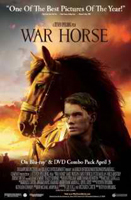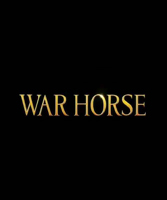Jeremy Irvine
Peter Mullan
Emily Watson
Niels Arestrup
David Thewlis
Tom Hiddleston
Benedict Cumberbatch
Celine Buckens
Toby Kebbell
Patrick Kennedy
Leonard Carow
David Kross
Matt Milne
Robert Emms
Albert Narracott
Ted Narracott
Rose Narracott
Grandfather
Lyons
Captain Nicholls
Maj. Jamie Stewart
Emilie
Geordie Soldier
Lt. Charlier Waverly
Michael
Gunther
Andrew Easton
David Lyons


 Just before the outbreak of World War I, a colt is born in a small English countryside farming village. As the colt grows, he is befriended by Albert Narracott (Irvine). Albert sees something special in the colt's demeanor. When the colt comes of age, Albert persuades his uncle Ted (Mullan) to buy the horse to help plow the fields. The family farm is facing foreclosure and the horse, now named Joey, is the last chance the family has to hold on to the farm.
Just before the outbreak of World War I, a colt is born in a small English countryside farming village. As the colt grows, he is befriended by Albert Narracott (Irvine). Albert sees something special in the colt's demeanor. When the colt comes of age, Albert persuades his uncle Ted (Mullan) to buy the horse to help plow the fields. The family farm is facing foreclosure and the horse, now named Joey, is the last chance the family has to hold on to the farm.
After Ted Narracott becomes the highest bidder for Joey, the rest of the farming community are amazed that Narracott is going to use the horse to plow fields. The townsfolk come out of the wood works to berate Albert and Joey. The two are the laughing stock of the entire county. ("My mule don't like you laughing at him. Now if you'll just apologize, and I know you will." - The Man with No Name) Joey takes this personally and begins pulling the plow for all he's worth. By the time the field is done being plowed, both Albert and Joey are bruised and bloody, but they have gained the admiration of the entire county.
When war breaks out, there is a rush for young men to enlist and for horses to be used in the cavalry. Everyone is psyched and ready to show the Germans "what for". That is everyone except Albert. After the crop is ruined in a rainstorm, Uncle Ted sells Joey for the war effort and the extra cash to pay his debts.
 As the troops prepare for war, the story changes from the typical Spielberg dysfunctional family flick into something much more profound. Joey, the War Horse, becomes the center piece for the remainder of the film. The film is about a horse: his trials, successes and the friends he makes on his journey through war-torn France. The horse actually carries the picture with the human actors playing second fiddle. The human actors explain the story. The horse makes us feel the story. This is an amazing feat for an animal to pull off.
As the troops prepare for war, the story changes from the typical Spielberg dysfunctional family flick into something much more profound. Joey, the War Horse, becomes the center piece for the remainder of the film. The film is about a horse: his trials, successes and the friends he makes on his journey through war-torn France. The horse actually carries the picture with the human actors playing second fiddle. The human actors explain the story. The horse makes us feel the story. This is an amazing feat for an animal to pull off.
In one key sequence, director Steven Spielberg captures the horror and brutality of war. Acting on information gleaned from a scout, the British cavalry lays a trap for the unsuspecting German troops. The plan is to ride through tall grass and outflank the sleeping troops. The trap is set and the British cavalry rides gung-ho directly into it. The scene cuts between charging British soldiers, closeups of machine guns firing, and long shots of riderless horses running passed the German line.
 Another classic "Spielbergism" is the crane or traveling shot that reveals something quite different. A young French girl and her grandfather have befriended Joey and another horse. The girl and grandfather have just had one of the best days of their lives. They are walking up a hill from an idyllic picture-perfect stream. As the camera cranes upwards, the shot reveals German troops ransacking the farmhouse and confiscating the two horses.
Another classic "Spielbergism" is the crane or traveling shot that reveals something quite different. A young French girl and her grandfather have befriended Joey and another horse. The girl and grandfather have just had one of the best days of their lives. They are walking up a hill from an idyllic picture-perfect stream. As the camera cranes upwards, the shot reveals German troops ransacking the farmhouse and confiscating the two horses.
Throughout all of the trials and tribulations of war, it is Joey's fire, grit and spunk that continually sets him apart from other horses. To the untrained eye, Joey is just a horse. Anyone who knows something about horses instantly recognizes that Joey is special. Some of the German troops and the French family see this and take pity on the horse. The French family tries to hide Joey while some of the Germans give Joey his freedom.
The last time Joey is set free is the show piece of the picture. Joey has just finished a stint hauling a cannon up a tall, steep, muddy hill. The horse is exhausted. Orders are to put the horse back on the line to haul another cannon. The German horse wrangler disobeys his orders. He sets Joey free yelling "Run!". Joey takes off, hell bent for leather! Not knowing where to run, Joey evades a tank, runs over, around and through the German fox holes until strands of barbed wire bring him to a crashing halt. The sequence is exhilarating. Spielberg's camera seems to have trouble keeping up with the racing horse.
Spielberg also remembers to add humor to a dark scene. The night is dark and foggy. Joey is struggling with the barbed wire. The British troops realize that a horse, not a cow, is making the fuss between the two armies. One brave British soldier grabs a white flag and heads out to rescue the horse. A bullet whizzes passed his head. The soldier yells at the Germans, "Don't you know the meaning of a white flag?". The scene gets funnier when a German soldier also comes to Joey's aid. The two ask for wire cutters. Out of the darkness comes a host of wire cutters raining down around them. Once freed, Joey's life now hangs in the balance. Both sides lay claim to the horse. The two soldiers decide to settle this the old-fashioned way, not with their fist but with the flip of a coin. In the midst of a battlefield, two soldiers are searching their pockets for something they can toss to settle Joey's fate.
 The story of Joey, the War Horse, comes full circle. In an amazing twist of fate, Joey is reunited with Albert Narracott, who has joined the war effort to follow in his father's footsteps. The father had died earlier in the service of the British Army.
The story of Joey, the War Horse, comes full circle. In an amazing twist of fate, Joey is reunited with Albert Narracott, who has joined the war effort to follow in his father's footsteps. The father had died earlier in the service of the British Army.
After the war ends, Joey has one last trial to overcome. Due to the expense of repatriating the horses brought from England to France, the horses are collected and sold at auction. The old French farmer has come to the auction. He has sold everything he possibly could. His granddaughter died in the war and the farmer wants to buy Joey as a reminder of her. The Frenchman outbids Albert who has collected money from his fellow soldiers in order to purchase Joey. Joey is slated to spend his remaining years in France. The people are all right with this, but Joey has other plans. Joey desperately wants to go home to the place where he was born. The Frenchman, seeing Joey's reluctance to go with him, turns the reins over to Albert. In a strange gesture, the Frenchman pulls out an old, dirty red ribbon. He asks Albert if he knows what this is. Albert recognizes the ribbon as his father's. Albert tied the ribbon to Joey's reins as a sort of good luck charm. Albert is touched by the sight of the ribbon. If you don't have a tear in your eye during this scene, you must be dead.
Joey, or whatever the real horse's name is, is the star and emotional center piece of War Horse. The human actors carry their roles appropriately except for the old French farmer and his granddaughter. The two actors not only have a strong chemistry together, they have also bonded with the two horses. This wordless connection is apparent in that sequence of the the film. The horse is more expressive, through his heroic actions, the gestures of his face and his body language, than his fhuman counterparts. This elevates the film. A horse wins the Best Actor category at the Academy Awards. Go figure!
Movie review © Lawrence L. Novotny. All Rights Reserved.
All images © 2011 DreamWorks SKG
Reliance Entertainment
Amblin Entertainment
Kennedy/Marshall Company, The
Touchstone Pictures